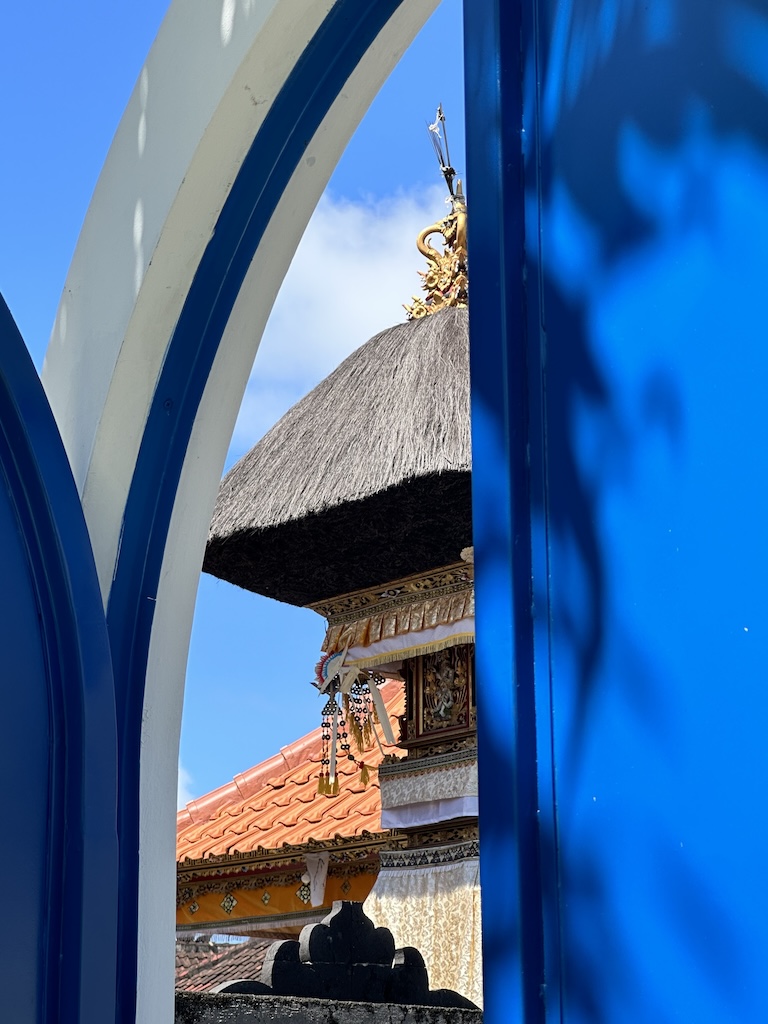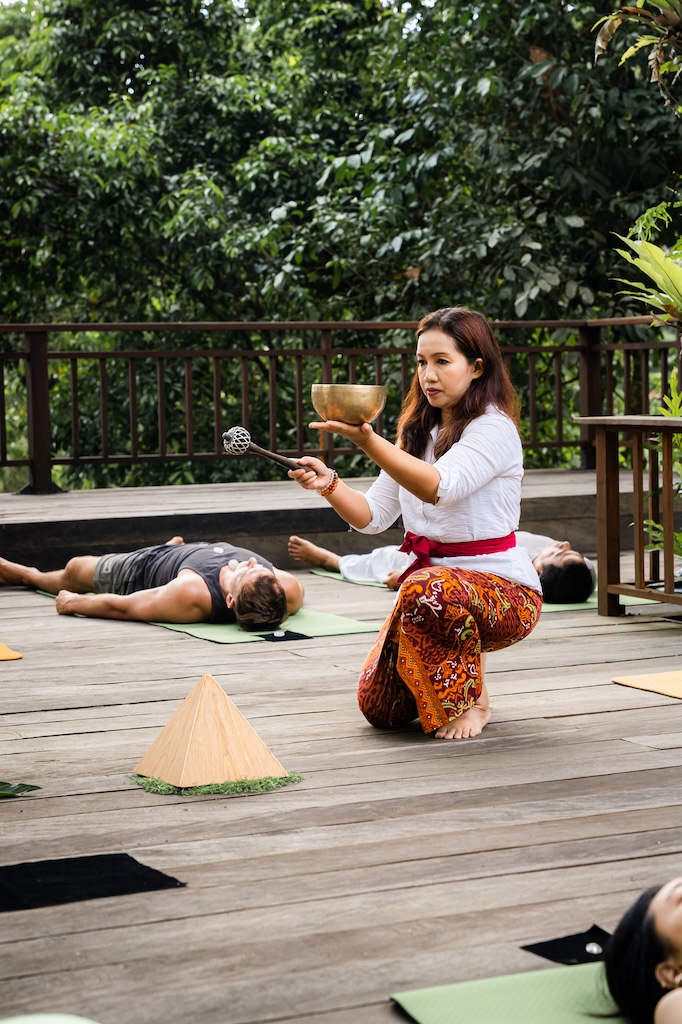
If you’ve been considering moving to Bali, this is a comprehensive guide with all the essential information you need to know before you go.
Living on The Island Of The Gods might seem like paradise, but there are a few things you should consider before making the big decision to make Indonesia your new home.
Whether you’re a digital nomad looking for the best coworking spaces, on a gap year adventure, or someone looking to find a new home base, Bali is the perfect choice.
Introduction to Bali: Island of Gods

Bali is one of the most popular tourist destinations in the world. Known for its beautiful beaches, unique culture, and lush rice fields.
It is an attractive destination that appeals to a wide range of visitors. From those seeking relaxation on its sun-soaked beaches to adventure enthusiasts exploring its rainforests and iconic rice terraces.
Many tourists come for a short stay as backpackers or part of organized tours. Usually they touch on the highlights, but rarely get a chance to stay for more than a few weeks.
Embracing Cultural Diversity
Bali’s unique and rich culture, deeply influenced by Hindu traditions, is reflected in its daily life, ceremonies, and magnificent ancient temple complexes.
The island offers a variety of living experiences, catering to different preferences and budgets.
Expats and digital nomads are drawn to Bali for its affordable cost of living, tropical climate, and the welcoming nature of its people.
The communities in areas like Ubud are known for their focus on wellness and spirituality, offering a plethora of yoga and meditation retreats. While regions such as Seminyak and Canggu are more known for their vibrant nightlife, dining, and shopping scene.
Bali’s infrastructure supports a comfortable lifestyle for residents and tourists alike. With a wide range of accommodation options, from luxury oceanfront residences to modest guesthouses.
The island’s healthcare system is evolving, with clinics and private hospitals that cater to both locals and foreigners.
However, despite its popularity, Bali faces challenges such as environmental sustainability and traffic congestion. Which we hope are being addressed through different initiatives and regulations.
For visitors and those considering moving to Bali, the island promises a blend of natural beauty, cultural depth, and a supportive community.
Whether it’s for a short time or a longer stay, Bali offers an enriching experience that combines the tranquility of its natural surroundings with the warmth and hospitality of its people.
Why Move to Bali?
Choosing Bali as a new home extends beyond its beautiful landscapes and warm climate; it’s about embracing a lifestyle that prioritizes balance, wellness, and community.
The island’s ethos, deeply rooted in Balinese Hinduism, promotes harmony between the spiritual, human, and natural worlds. Offering a unique perspective on life that many find transformative.
For those seeking personal growth or a shift towards a more mindful or laid-back way of living, Bali provides the perfect environment.
Additionally, the island’s dynamic expat scene fosters an environment of inclusivity and support making the transition to a new culture smoother and more enjoyable.
Whether it’s the pursuit of a healthier lifestyle, the appeal of joining a diverse and creative community, or simply the desire for a change of pace in a stunningly beautiful setting, Bali offers a high quality of life that draws people from around the world to call it home.
Preparing for the Move: Essential Checklist

Before you make the big decision to leave your home country behind and move to Bali, there are some important things you should consider and organize.
Here is a checklist of essentials to do and know before you make this Indonesian Island your new home.
Get the correct visa
It’s essential to be well-informed and get the right type of visa for your stay in Bali. The best way to do this is with the help of a visa agent. They will handle all the paperwork and ensure everything is done correctly.
When picking a visa agent, make sure it is a reputable establishment with good reviews. Unfortunately, there are many flaky agents and agencies around!
If you’re not sure yet how long exactly you’ll be staying in Bali, you can get a 30 or 60 day tourist visa online or on arrival. However, you’ll have to leave the country after that time period is up.
For long-term stays, it’s highly recommended to apply for a social visa or a business visa. These visas let you stay in Indonesia for up to 6 months. The price is around US $100 per month, but usually has to be paid several months in advance.
Note that these visas are single entry, so if you leave the country, you will need to go through the process again and get a new visa.
If you’re planning on starting your own business in Bali, I recommend looking into getting an investor KITAS. This visa is valid for two years and is about half the price of a social or business visa when divided by month.
Again, consult a visa agent to learn what are the visa regulations and required documents. Note that a KITAS visa is not a work permit. It does not allow you to work in Indonesia beyond managing your own business.
Recently, a digital nomad visa has been introduced. It’s a visa that allows individuals employed by companies outside of Indonesia to live in Bali for up to a year.
Get an international health insurance policy
Having international health insurance is essential when traveling or moving to Bali.
The island, while offering a myriad of breathtaking experiences and a vibrant lifestyle, also presents unique health challenges, from tropical diseases to unexpected accidents.
International health insurance provides a safety net. It ensures access to quality healthcare with international standards without the burden of exorbitant costs.
Bali’s healthcare facilities vary widely in quality; while there are reputable clinics and hospitals, especially in more developed areas, that might not always be the case in remote locations.
In cases requiring specialized treatment or medical evacuation, the costs can escalate quickly. An appropriate health insurance policy not only offers peace of mind but also ensures that you receive the best possible care, allowing you to focus on recovery without financial stress.
For expats and long term travelers, integrating into a new healthcare system can be daunting, and having comprehensive coverage bridges this transition, making it smoother and more secure.
Investing in international health insurance is a critical step in safeguarding your health and wellbeing while exploring or moving to Bali.
Get travel-friendly credit and debit cards
Securing travel-friendly debit cards and at least one credit card is a smart move for anyone planning to travel or live in Bali.
These cards are specifically designed to cater to the needs of travelers. They often offer benefits such as no foreign transaction fees, competitive exchange rates, and various travel insurance options.
The local currency is the Indonesian Rupiah (IDR) and cash transactions are very common. However, access to ATMs can be inconsistent outside the more developed areas. Having reliable cards can provide both convenience and security.
And often, travel-friendly cards come with additional perks such as reward points for flights and accommodations, emergency assistance services, and even complimentary access to airport lounges. These benefits not only enhance your travel experience but also offer financial efficiency and peace of mind.
Be sure to choose a card that aligns with your travel habits and spending patterns. Maximize your rewards while minimizing cost and make your Bali adventure or residency more enjoyable and worry-free.
I recommend using Wise or Revolut, which can also help with sending money abroad without high fees. Once you have a KITAS visa in Bali, you can also open a local bank account, which will make payments a lot easier.
Learn how to drive a scooter

Mastering the skill of scooter driving before traveling or moving to Bali is a practical and important preparation. It will significantly enhance your mobility and independence on the island.
Scooters are an extremely common mode of transportation in Bali. It offers an efficient and cost-effective way to navigate through traffic, explore hidden gems, and experience the island’s scenic landscapes at your own pace.
However, Bali’s roads can be the biggest challenge for inexperienced riders, with varying road conditions, unique traffic laws, and a driving culture that may differ markedly from what you’re used to.
Taking the time to learn how to drive a scooter, familiarize yourself with safe riding practices, and understand local road etiquette before your arrival can not only boost your confidence but also ensure your safety and that of others on the road.
Additionally, being proficient in scooter driving allows you to fully embrace the freedom and adventure that Bali offers, making you independent and ready to explore!
Learn some basic Indonesian
Learning some basic Indonesian before traveling or settling in Bali can significantly enrich your experience on the island.
While English is widely spoken in tourist areas, a basic grasp of the local language will help a lot. It demonstrates respect for the local community and can open doors to more authentic interactions with the Balinese people.
Simple phrases for greetings, directions, and transactions not only make daily activities much easier, but also help with making friends with locals, making your stay more enjoyable.
Indonesian is known for its straightforward pronunciation and grammar. It is relatively easy for English speakers to pick up the basics. Additionally, learning the language can be a bridge to understanding the cultural nuances and traditions of Bali, enhancing your appreciation of the island’s heritage.
Of course, Bali also has its own language, Balinese, so if you truly want to dive in, you can learn both. However, Indonesian is much more common and also easier to learn, so keep that in mind.
Cost of living
Cost of living in Bali can be very affordable. However, having some savings is still essential before you make the decision of moving to Bali. Have at least a few thousand US $ saved up to help you pay for visas and get settled.
Since a work permit for Indonesia is expensive and hard to come by, having a remote job is highly recommended when moving to Bali.
Make sure that you’re following local laws and not working locally, which can be punished heavily by local authorities.
You don’t need much money compared to other countries, but, having a steady income of at least US $1,000 or ideally US $2,000 or more per month is absolutely necessary for paying for a very basic lifestyle in Bali.
Finding accommodation and understanding the different areas in Bali

Finding long-term accommodation in Bali is best done on arrival, so you can look at different options and compare them.
I recommend you book a place through Airbnb to stay for a few days when you arrive. This way you can get to know the different neighborhoods, and you can negotiate a better rate for long-term stays.
To find your dream Bali home, the best options are to search on Facebook groups, hire a real estate agent, and explore the island to discover potential places.
Here are the most popular neighborhoods for expats and digital nomads living in Bali permanently:
Canggu
Living in Canggu offers a perfect blend of laid-back beach life and a vibrant expat and digital nomad community. It’s a favorite among remote workers and surf enthusiasts.
This trendy neighborhood has a wide variety of coworking spaces, health-conscious cafes, and yoga studios, catering to a lifestyle that values wellness and productivity.
The black sand beaches of Canggu are famous for their surf breaks, while its streets are lined with restaurants, boutiques and lively bars, providing a dynamic social scene.
Despite its popularity, Canggu maintains a relaxed vibe, offering a balanced lifestyle that combines work, play, and relaxation.
Uluwatu
Uluwatu, perched on the southern cliffs of Bali’s Bukit Peninsula, is known for its breathtaking ocean views and some of the island’s most iconic beaches.
This area attracts those seeking a tranquil living environment, away from the hustle and bustle of Bali’s more crowded spots.
Uluwatu’s stunning beaches, renowned for their world-class surf breaks, are surrounded by a rugged coastline, offering a sense of seclusion and connection with nature. The community here is close-knit, with a focus on surf culture and a laid-back way of life.
In the last year, Uluwatu has seen a lot of development, which has brought more cafes, restaurants, nightlife, and accommodation options.
It still remains pretty small and untouched, but it’s a neighborhood that is definitely up and coming.
Full guide on best things to do in Uluwatu
Ubud
Ubud is the cultural heart of Bali, a hotspot for artists, writers, and spiritual seekers. Surrounded by lush rainforests and terraced rice paddies. Living in Ubud is like stepping into a living postcard of Bali’s famed landscapes.
The town is rich in Balinese culture, offering a plethora of ancient temples, traditional dance performances, and art galleries.
Ubud is also known for its holistic wellness scene, with numerous retreats, spas, and organic eateries promoting a healthy lifestyle.
The community is diverse, welcoming expatriates and locals alike who are drawn to its creative spirit and peaceful ambiance.
Sanur
Sanur is one of Bali’s original beach resorts, offering a more mature atmosphere compared to its bustling western counterparts.
Known for its calm waters and colorful jukung fishing boats. Sanur’s beachfront promenade is lined with cafes and restaurants, making it a favorite for leisurely mornings and serene sunrises.
The neighborhood appeals to families and older expats seeking a quiet, community-oriented lifestyle. Sanur maintains a charm with its blend of traditional Balinese culture and modern conveniences.
You can expect a relaxed pace of life, ideal for those looking to escape the island’s more touristy areas.
Seminyak
Seminyak is pretty close to Canggu, depending on the traffic, only 20-25 minutes away on a motorbike. It stands out as Bali’s premier destination for luxury living and high-end lifestyle.
It boasts stylish boutiques, fine dining, and some of the island’s most upscale accommodations and spas.
The neighborhood’s beaches are famous for their vibrant sunsets and chic beach clubs. Offering the ideal backdrop for socializing and relaxation.
Living in Seminyak means having access to an array of international amenities, a vibrant atmosphere, and trendy nightlife. At the same time, Seminyak also manages to keep things chill while still serving up that classic Balinese hospitality vibe.
Other important things to know

Local customs
Bali is a place with a rich cultural heritage. From daily offerings to temple ceremonies (many ceremonies!), these cultural practices are deeply ingrained in Balinese life.
To make moving to Bali a enjoyable experience, it’s essential to respect and adopt their customs and traditions. Among the biggest holidays celebrated on the island are:
Galungan and Kuningan: Galungan marks the victory of Dharma (good) over Adharma (evil). It is celebrated with elaborate offerings, traditional dances, and prayers at temples across the island. Kuningan, which falls ten days after Galungan, signifies the day when ancestral spirits return to heaven. It’s celebrated with feasting and more offerings.
Nyepi (Day of Silence): My personal favorite holiday in Bali! Nyepi is Bali’s New Year based on the Balinese Saka calendar. It’s a day of complete silence. The island completely shuts down, and no one is allowed to go out (for real!). It’s a beautiful and unique experience to witness and embrace.
Weather
Bali enjoys a tropical climate year round. It is characterized by two main seasons: the dry season and the wet season.
The dry season typically runs from April to September, offering sunny days and lower humidity levels. The rainy season, from October to March, brings occasional rainfall and higher humidity.
Balinese food

Local food in Bali features a diverse array of flavors and spices. With traditional favorites like Nasi Goreng, Satay, and Babi Guling.
As long as you are in the most developed areas of Bali you will be able to find a variety of local restaurants as well as international options. Additionally, you will find local markets and grocery stores.
Eating local is always the most cost-efficient option. But, you will find some imported products at a higher price in convinience stores.
Note: Do not drink tap water, it is not safe!
For comprehensive insights into safety in Bali, delve into my article titled “Is Bali Safe?” where I thoroughly explore every precaution you should consider before visiting or moving to Bali.







